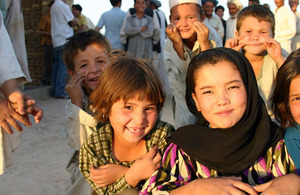UK Statement to the OSCE on Tolerance and Non-Discrimination
Organization for Security and Co-operation in Europe holds its Human Dimension Implementation meeting, Warsaw, Poland

Afghanistan, Carpet weaver's children, photo taken by Mary Maguire
Working Session 2 – Tolerance and Non-Discrimination
24th September 2013
I align myself with statement made by the European Union, but would also like to make some remarks about why the UK prioritises efforts to reduce the harm caused by hate crime.
The United Kingdom is committed to promoting and protecting human rights for all, without discrimination on any grounds, as enshrined in Article 1 of the Universal Declaration of Human Rights. Indeed, we believe that a State’s willingness to protect its minority communities one of the best indicators of a thriving democracy. It is, therefore appropriate that we view protection from hate crime as a basic human right: No one should suffer hostility because of their personal characteristics, whether that be race, religion or belief, sexual orientation, disability or gender identity.
It is important that States realise that guaranteeing true equality requires governments to do more than just provide services. It is a sad fact that the more isolated members of our societies, such as new migrant communities, are more susceptible to hate crime and less likely to seek the services designed to protect them from such abuse. It is vital then, that States maximise efforts to understand hostility, even when it is unreported.
We all need to work closely with civil society, through education and law enforcement, to reduce the harm that it causes to our societies. It is also vital that Civil Society groups are supported to work together for mutual benefit. I would like to invite you to a side event in room 3 at 1pm today where we will highlight how valuable such collaboration can be. You will hear about ‘Tell Mama’, an initiative funded by the British government to protect the British Muslim community and the invaluable support they have received from The Community Security Trust, a more established Jewish security organisation in the United Kingdom. We believe that it is a mature and effective relationship that gives a valuable example to all States and civil society groups. The session will also provide the space to allow others to share their experiences.
We congratulate the Office for Democratic Institutions and Human Rights for their continued work in supporting States to combat hate crime. Their annual hate crime report will again highlight some of the positive work being done. The report will, however highlight a huge disparity of responses from participating States, particularly in the recording of hate crime and the transparent publication of such data. The one glaring limitation of the report is that it is impossible to make any meaningful comparisons when States’ reported data ranges from over 50,000 hate crimes to some reporting single figures. We would encourage all States to ask themselves whether their data reflects the real experiences of their citizens.
Authorities in the United Kingdom have worked hard to build the confidence of minority groups to encourage reporting and we can say that this definitely reaps rewards. It is much easier to respond to emerging trends than it is to deal with long-standing societal tensions and our experience has shown that early intervention prevents an escalation in such tensions which, if left unchecked, can lead to outbreaks of civil disorder. It is difficult to imagine how we can reduce hostility if we do not have systems in place to encourage the reporting and recording of hate crimes.
It is important that we utilise meetings like this to highlight areas where international cooperation can assist in the protection of our citizens. One such area is the hate crime that takes place by means of or is fueled by Internet communication. We recognise that participating states have different legal frameworks but there is common ground and shared goals. Ministerial Council Decision 9/2009 committed us to seek opportunities to co-operate and thereby address the increasing use of the Internet to advocate views constituting an incitement to bias-motivated violence including hate crimes. In addressing these issues we should of course always ensure that our actions our compatible with our freedom of expression commitments. We welcome the work of the Inter-Parliamentary Coalition to Combat Antisemitism and their Cyber-Hate Task Group which was presented at a side event yesterday. They have been able to bring the major Internet Industry Groups to the table to identify and take forward collaborative initiatives to reduce harm, whilst protecting free speech. Their summary report is available outside.
We believe that such international collaboration is vital to provide clarity in our relationships with the Internet industry, but also to encourage the counter-narrative which ensures that positive, inclusive material is as easy to access as that which is hateful and divisive. We welcome the ODIHR hosted meeting here tomorrow and would encourage them to explore whether the National Point of Contacts forum could be utilised to explore this issue when they meet in November.
A fuller version of this statement has been submitted to the conference organisers, but in concluding we encourage participants to rise to the challenges that we all face in ensuring the basic human right to be free from targeted abuse such as hate crime.
Follow us on Twitter: @UKOSCE